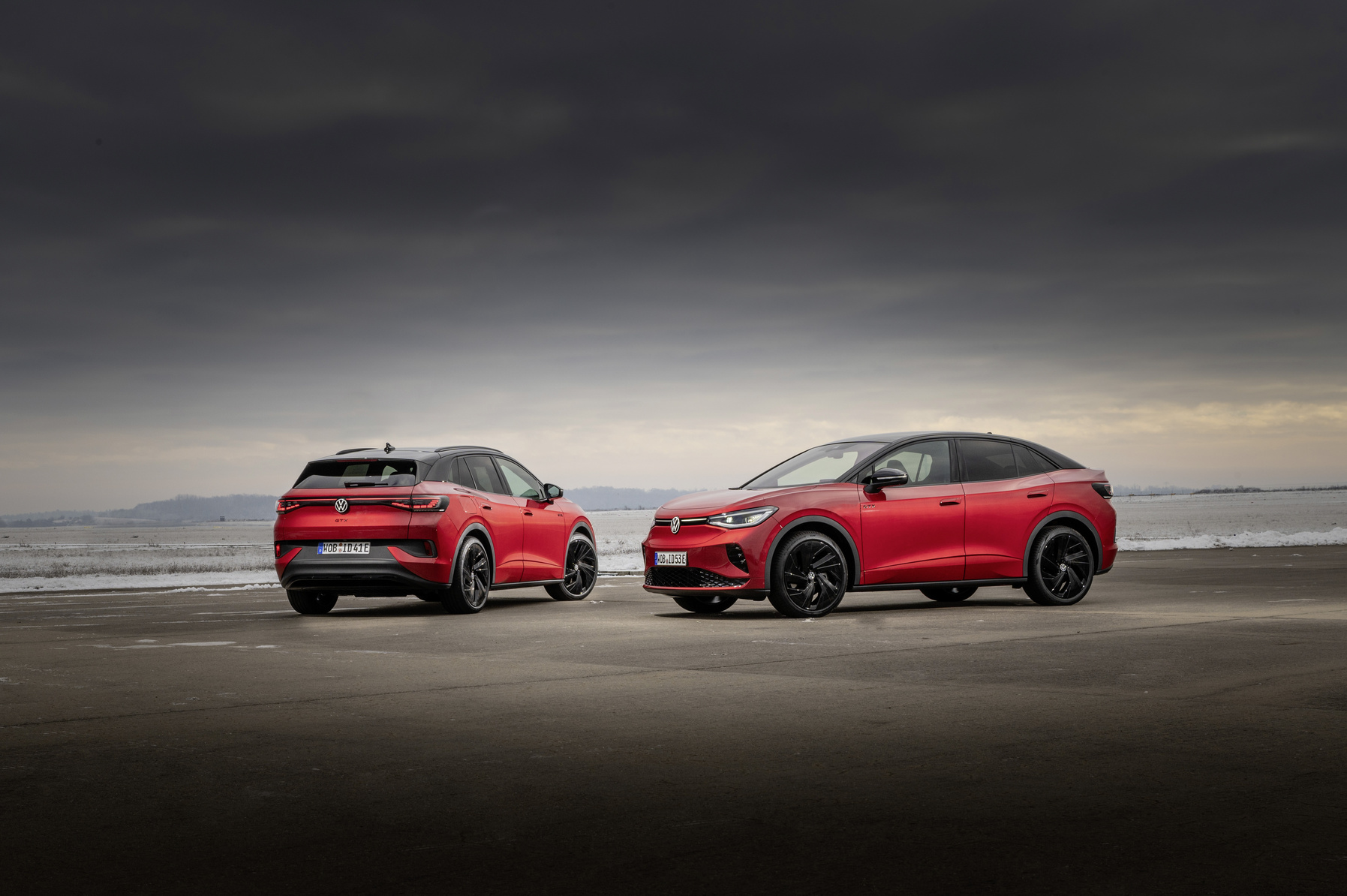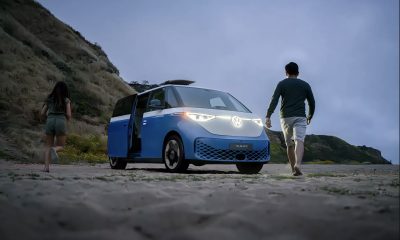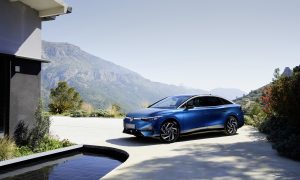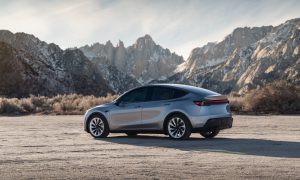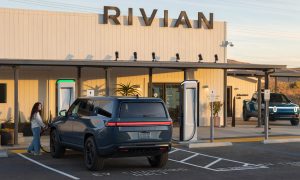The upgraded Volkswagen ID.4 and ID.5 models are now available for pre-order.
Volkswagen enhanced the new ID.4 and ID.5 electric vehicles with a better infotainment system and improved software. Some variants of the VW ID.4 and ID.5 also received a new electric drive motor, promising better performance of the electric vehicles.
“Our customers can look forward to exceptional technical performance with the new ID.4 and ID.5. Software and infotainment are state-of-the-art. In addition, there are extensive assistance systems that leave nothing to be desired. The further improved ID.4 and ID.5 models are at the top of the segment with their new technologies and the acknowledged balance of driving, comfort, and spaciousness,” noted Volkswagen
Infotainment and Software Improvements
The upgraded Volkswagen ID.4 and ID.5 have a new infotainment system with an increased screen size of 12.9 inches. The German automaker says its latest software introduces a new menu structure and enhanced head-up display to the electric vehicles’ infotainment system.
The new ID.4 and ID.5 now have illuminated touch sliders for the air conditioning and volume control. Volkswagen also removed the driving mode selector from the cars’ Digital Cockpits. Now, drivers can select a driving mode through a steering column switch, similar to the ID.7. The upgraded ID.4 and ID.5 also feature new premium sound systems from Harman Kardon with 480 Watts of music output and 10 speakers—including a center speaker and a subwoofer.
New Drive Motor
Volkswagen’s upgraded ID.4 and ID.5 vehicles have a new electric drive motor and the German automaker’s next-generation 77kWh battery. The new drive motor reduces energy consumption and increases power simultaneously.
The ID.4 and ID.4 Pro variants used a 210 kW electric driver motor, resulting in 60 kW more power than previous models. The torque of the 210 kW (286 PS) drive motor jumped from 310 to 545 Nm, yielding an extra 75% of torque.
Meanwhile, the All-Wheel-Drive ID.4 Pro 4Motion has a system power of 210 kW (286 PS), an increase of 15 kW (21 PS). Volkswagen’s sporty GTX models deliver up to 250 kW (340 PS) of system power, up by 30 kW (41 PS). Volkswagen claims that the GTX models’ improvement in dynamic characteristics is noticeable, as indicated by its 0 to 100 km/h in under 6 seconds.
Longer Range, Faster Charging
With Volkswagen’s new 77 kWh battery, the upgraded ID.4 and ID.5 vehicles have a longer range. The new ID.4 Pro covers 17 kilometers more range than its predecessor. It can run for 550 kilometers per charge. Meanwhile, the upgraded ID.5 has a range of up to 556 kilometers, an increase of 11 km compared to the previous iteration.
The AWD variants of the new ID.4 and ID.5 offer an increased DC charging capacity of 175 kW from 135 kW. With their new charging capacity, the ID.4 and ID.5 AWD variants can charge to have enough range to cover 178 km in just 10 minutes.
The Teslarati team would appreciate hearing from you. If you have any tips, contact me at maria@teslarati.com or via X @Writer_01001101.
News
Tesla begins Robotaxi certification push in Arizona: report
Tesla seems serious about expanding its Robotaxi service to several states in the coming months.

Tesla has initiated discussions with Arizona transportation regulators to certify its driverless Robotaxi service in the state, as per a recent report from Bloomberg News. The move follows Tesla’s launch of its Robotaxi pilot program in Austin, Texas, as well as CEO Elon Musk’s recent comments about the service’s expansion in the Bay Area.
The Arizona Department of Transportation confirmed to Bloomberg that Tesla has reached out to begin the certification process for autonomous ride-sharing operations in the state. While details remain limited, the outreach suggests that Tesla is serious about expanding its driverless Robotaxi service to several territories in the coming months.
The Arizona development comes as Tesla prepares to expand its service area in Austin this weekend, as per CEO Elon Musk in a post on X. Musk also stated that Tesla is targeting the San Francisco Bay Area as its next major market, with a potential launch “in a month or two,” pending regulatory approvals.
Tesla first launched its autonomous ride-hailing program on June 22 in Austin with a small fleet of Model Y vehicles, accompanied by a Tesla employee in the passenger seat to monitor safety. While still classified as a test, Musk has said the program will expand to about 1,000 vehicles in the coming months. Tesla will later upgrade its Robotaxi fleet with the Cyercab, a two-seater that is designed without a steering wheel.
Sightings of Cybercab castings around the Giga Texas complex suggests that Tesla may be ramping the initial trial production of the self-driving two-seater. Tesla, for its part, has noted in the past that volume production of the Cybercab is expected to start sometime next year.
In California, Tesla has already applied for a transportation charter-party carrier permit from the state’s Public Utilities Commission. The company is reportedly taking a phased approach to operating in California, with the Robotaxi service starting with pre-arranged rides for employees in vehicles with safety drivers.
News
Tesla sets November 6 date for 2025 Annual Shareholder Meeting
The automaker announced the date on Thursday in a Form 8-K.

Tesla has scheduled its 2025 annual shareholder meeting for November 6, addressing investor concerns that the company was nearing a legal deadline to hold the event.
The automaker announced the date on Thursday in a Form 8-K submitted to the United States Securities and Exchange Commission (SEC). The company also listed a new proposal submission deadline of July 31 for items to be included in the proxy statement.
Tesla’s announcement followed calls from a group of 27 shareholders, including the leaders of large public pension funds, which urged Tesla’s board to formally set the meeting date, as noted in a report from The Wall Street Journal.
The group noted that under Texas law, where Tesla is now incorporated, companies must hold annual meetings within 13 months of the last one if requested by shareholders. Tesla’s previous annual shareholder meeting was held on June 13, 2024, which placed the July 13 deadline in focus.
Tesla originally stated in its 2024 annual report that it would file its proxy statement by the end of April. However, an amended filing on April 30 indicated that the Board of Directors had not yet finalized a meeting date, at least at the time.
The April filing also confirmed that Tesla’s board had formed a special committee to evaluate certain matters related to CEO Elon Musk’s compensation plan. Musk’s CEO performance award remains at the center of a lengthy legal dispute in Delaware, Tesla’s former state of incorporation.
Due to the aftermath of Musk’s legal dispute about his compensation plan in Delaware, he has not been paid for his work at Tesla for several years. Musk, for his part, has noted that he is more concerned about his voting stake in Tesla than his actual salary.
At last year’s annual meeting, TSLA shareholders voted to reapprove Elon Musk’s compensation plan and ratified Tesla’s decision to relocate its legal domicile from Delaware to Texas.
Elon Musk
Grok coming to Tesla vehicles next week “at the latest:” Elon Musk
Grok’s rollout to Tesla vehicles is expected to begin next week at the latest.

Elon Musk announced on Thursday that Grok, the large language model developed by his startup xAI, will soon be available in Tesla vehicles. Grok’s rollout to Tesla vehicles is expected to begin next week at the latest, further deepening the ties between the two Elon Musk-led companies.
Tesla–xAI synergy
Musk confirmed the news on X shortly after livestreaming the release of Grok 4, xAI’s latest large language model. “Grok is coming to Tesla vehicles very soon. Next week at the latest,” Musk wrote in a post on social media platform X.
During the livestream, Musk and several members of the xAI team highlighted several upgrades to Grok 4’s voice capabilities and performance metrics, positioning the LLM as competitive with top-tier models from OpenAI and Google.
The in-vehicle integration of Grok marks a new chapter in Tesla’s AI development. While Tesla has long relied on in-house systems for autonomous driving and energy optimization, Grok’s integration would introduce conversational AI directly into its vehicles’ user experience. This integration could potentially improve customer interaction inside Tesla vehicles.
xAI and Tesla’s collaborative footprint
Grok’s upcoming rollout to Tesla vehicles adds to a growing business relationship between Tesla and xAI. Earlier this year, Tesla disclosed that it generated $198.3 million in revenue from commercial, consulting, and support agreements with xAI, as noted in a report from Bloomberg News. A large portion of that amount, however, came from the sale of Megapack energy storage systems to the artificial intelligence startup.
In July 2023, Musk polled X users about whether Tesla should invest $5 billion in xAI. While no formal investment has been made so far, 68% of poll participants voted yes, and Musk has since stated that the idea would be discussed with Tesla’s board.
-

 Elon Musk1 week ago
Elon Musk1 week agoTesla investors will be shocked by Jim Cramer’s latest assessment
-

 Elon Musk3 days ago
Elon Musk3 days agoElon Musk confirms Grok 4 launch on July 9 with livestream event
-

 Elon Musk15 hours ago
Elon Musk15 hours agoxAI launches Grok 4 with new $300/month SuperGrok Heavy subscription
-

 News7 days ago
News7 days agoTesla Model 3 ranks as the safest new car in Europe for 2025, per Euro NCAP tests
-

 Elon Musk2 weeks ago
Elon Musk2 weeks agoA Tesla just delivered itself to a customer autonomously, Elon Musk confirms
-

 Elon Musk1 week ago
Elon Musk1 week agoxAI’s Memphis data center receives air permit despite community criticism
-

 Elon Musk2 weeks ago
Elon Musk2 weeks agoTesla’s Omead Afshar, known as Elon Musk’s right-hand man, leaves company: reports
-

 News2 weeks ago
News2 weeks agoXiaomi CEO congratulates Tesla on first FSD delivery: “We have to continue learning!”

